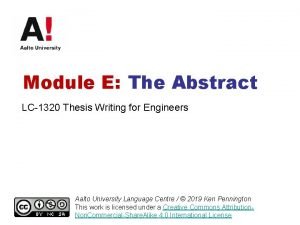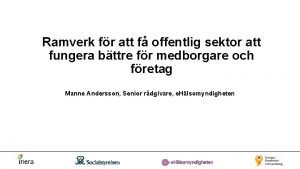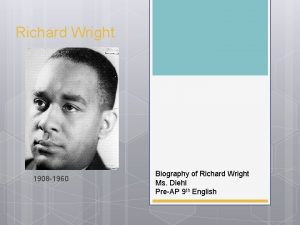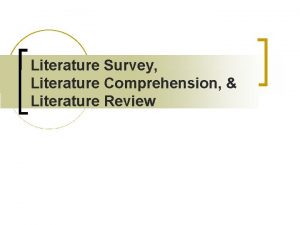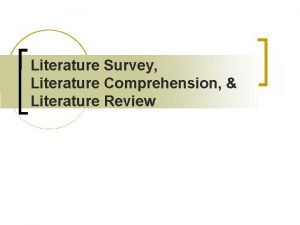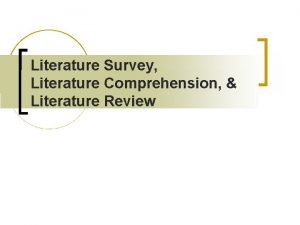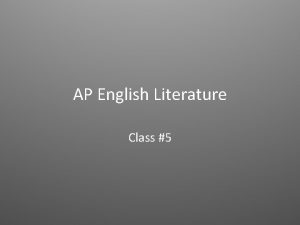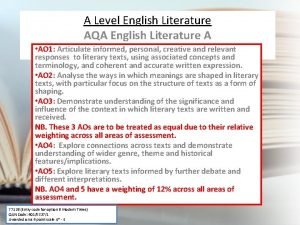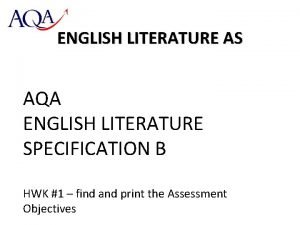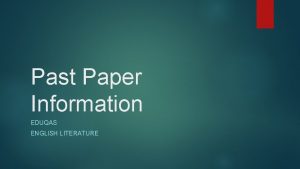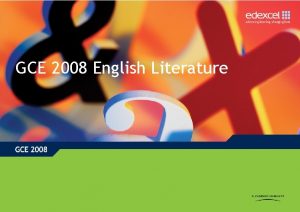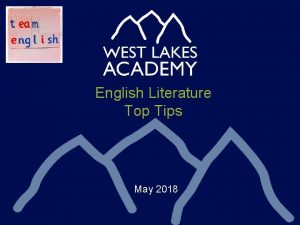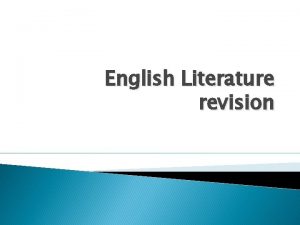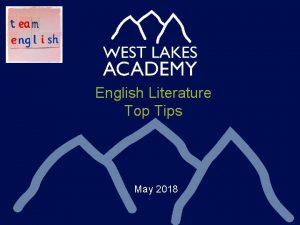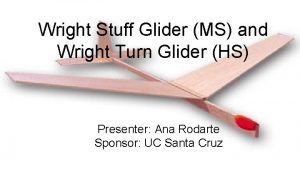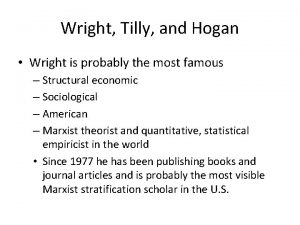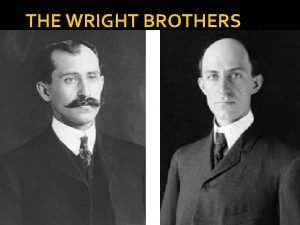Re Claiming Richard Wright for AP English Literature























- Slides: 23

(Re) Claiming Richard Wright for AP English Literature & AP English Language Teachers AP Annual Conference 2013 Pat Marshall, NBCT AYA/ELA & EA/ELA Presentation at patmarshall. weebly. com Email pmar 1062@yahoo. com for more information

Getting to know you… n Neighbor chat/individual reflection n What Wright do you already teach? n How do you teach it? n Problems that may have occurred/Successes to share n What do you want to take from this session in terms of possibly adding or expanding Richard Wright’s role in your AP classroom?

Getting to know Richard Wright

The “Essential” Richard Wright n Language n Black Boy (great summer reading) n Selections from Uncle Tom’s Children n Selections from the Richard Wright Reader n Literature n Native Son (ditto on summer reading) n Wright’s haiku n A Father’s Law

More of the “Wright Stuff” n Hazel Rowley’s biography Richard Wright: The Life and Times n Rite of Passage n Short YA book about a fifteen year old whose world is rocked by the revelation that his family is not his own. n The Outsider n “Cross Damon is a man at odds with society and with himself —a man of superior intellect who hungers for peace but who brings terror and destruction whosoever he goes” (from back cover) n 12 Million Black Voices

Introducing Richard Wright to Teens n Neighbor chat/individual thought n Getting our students “into” Richard Wright n Entry points for text(s) you teach or would consider teaching n Share best ideas with group n Cover Story Suggestion & Explanation

DO Judge a Book by its Cover

Date Check 1951 1966 2007 1945 2000 2005 1945 2000

Questions for “Reading” Images n The “Standards” we typically ask: n n n Who or What do you see? When was this image created — what is happening in the photograph? The image depicts Where? n The “Deeper Questions” we SHOULD be asking: n n What elements did the artist include? Why did the artist select this/these particular element(s)? What don’t we see? Why did the artist emphasize certain elements and not others? What’s in focus? What isn’t? Why did the artist create an image at this moment? What happened before or after this image was created? Why did the artist create the image from this angle? What might the scene have looked like from another vantage point — from left, right, behind, above, or below? How would that affect the viewer’s interpretation? Questions adapted from http: //www. learnnc. org/lp/pages/677

Discussion n With neighbor OR as an individual, choose ONE image and apply the image discussion template n Process out experience with group n Rationale for beginning with images and moving to text Accessibility n Alleviate resistance to Wright n Cross-disciplinary connections n

AP Language Wright Immersion Theme: Discovering/Creating the Self n. Black Boy n“The Ethics of Living Jim Crow” n“Joe Lewis Uncovers Dynamite” n“Blueprint for Negro Writing” n 12 Million Black Voices

AP Literature Partnerships: Theme: Discovering/Creating the Self n “Shooting an Elephant” n “Dog” Ferlinghetti George Orwell n “Clay” James Joyce (Dubliners, as a whole, really) n “Who Understands Me But Me? ” Jimmy Santiago Baca n “Time Does Not Bring Relief; You All Have Lied” Edna St. Vincent Millay n “Here Where Coltrane Is” Michael S. Harper n “I am the People, the Mob” Carl Sandburg n Wright n “We of the Streets” n “I Have Seen Black Hands” n Uncle Tom’s Children n Native Son

AP Language Textual Partnerships n “The Ethics of Living Jim Crow” n n n Exemplification Use of anecdote Implied thesis, though one is ostensibly stated. n Short story from Eight Men (“The Man Who Was Almost a Man”) or Uncle Tom’s Children (“Big Boy Leaves Home”) n Both stories in which young man has to leave home after having violated social parameters n Michelle Alexander’s The New Jim Crow (http: //www. youtube. com/watch? v=Xnqj. DVhj. M 0 w). n Overarching questions: n n n To what extent, if any, has Jim Crow (or other codes—written or not) maintained its grasp on American Society? How do social expectations/demands define a person’s participation in American Society? What responsibilities, if any, do individuals have for the development of a society?

Wright and the American Dream n Define Wright’s “American Dream” n Be sure to use text for support n Evaluate his capacity to achieve that dream n He does leave US for France; can’t accomplish what he wants in US. Was he right? Does the “dream” require residency? n What was the impact of Wright’s expatriation on other American Blacks’ dreams? n Do notable folk have a responsibility to their race, gender, creed, sexuality, etc. ?

More Intertextual Connections n “I Have Seen Black Hands” and “Chicago” n Tone, content, experience of the “other” n Native Son and Hamlet n n n Accidental murder as pivotal moment Social expectations moving protagonist Revenge n 12 Million Black Voices and Hard Times n Focusing on Depression Era n Black Boy and I Know Why the Caged Bird Sings n Problems with auto-biography; choices authors make & impact on audience n Haiku with Sonnets n Teaching volta via haiku VERY helpful!

Discussion/Reflection n With neighbor(s) or as an individual, choose one of the works from the packet and discuss/reflect on how you could incorporate that in your AP class next year. n OR…if you already teach Wright, what do you teach and how could you enhance that with something you’ve gained here today?

AP Testing n Practice, practice! n Why not practice with what you’re reading? n Weekly writing—one grade for quarter

Taming the Grading Monster n AP Essays minimum of 7 per quarter n n scores of 6 or higher Quarter 1 scores of 6 or higher Quarter 2 scores of 6 or higher Quarter 3 scores of 6 or higher Quarter 4 =D- (60); 0=F n 100 points total at end of quarter 2 =A+ (100); 1 =B+ (89); 0 =C (75) 3 =A+; 2 =B+; 1 =C; 0 =D (65) 5 =A+; 4 =B+; 2 =C; 1 =D; 0=F (59) 6 =A+; 5 =B+; 4 =C+; 3=C (75); 2=D (65); 1 AP essays are NOT eligible for revision; scores assume ALL essays are written. Failure to complete one or more essays will result in an automatic 10 point deduction per missing essay REGARDLESS of scores on the submitted essays. Hence, a student who only wrote three essays in the second quarter, scoring a 6 or better on all three, could only earn a 60% as four essays (4 x 10%) were missing.

Prompts n In 1953, Richard Wright made the following observation about the Black experience in America: “"Negroes, as they enter our culture, are going to inherit the problems we have, but with a difference. They are outsiders and they are going to know that they have these problems. They are going to be self-conscious; they are going to be gifted with a double vision, for, being Negroes, they are going to be both inside and outside of our culture at the same time. ” (The Outsider). Being both part of and separated from one’s society is a phenomenon affecting many characters in literature, regardless of race. Choose a novel or play in which a character experiences this sense of being both part of and separated from society. Then write a wellorganized essay in which you analyze how being both part of and separated from society affects this character and illuminate the meaning of the work as a whole.

Painless Prompts The following prompt is adapted from the 2007 AP English Literature and Composition free response test. You only have 40 minutes to construct and develop your essay response. I’ll evaluate where you are using an AP scoring guide, but this evaluation is ONLY FOR YOUR INFORMATION. The grade for this assignment is 25 or 0. You either do the essay or you don’t. So, no stress—take it for the learning experience and diagnostic it is designed to be. In many works of literature, past events can affect, positively or negatively, the present actions, attitudes, or values of a character. In Native Son, Bigger must contend with a past in which people of his race are imprisoned by the unwritten rules of his social strata. How does Bigger’s relationship to his past contribute to the meaning of Native Son as a whole?

Wright on Hurston n Writing in 1937 for the magazine New Masses (5 October 1937: 22 -23), Richard Wright reviewed Zora Neale Hurston’s Their Eyes Were Watching God along with another "negro novel. " Read Wright’s review of Hurston’s novel, then write an essay in which you determine the extent to which Wright is correct in his evaluation of Hurston’s work. n OR…write an essay in which you analyze the strategies Wright uses to establish his position on Hurston’s work.

Wright on Hurston Take II n Of Zora Neale Hurston’s Their Eyes Were Watching God, writer and critic Richard Wright said “Miss Hurston can write, but her prose is cloaked in that facile sensuality that has dogged Negro expression since the days of Phillis Wheatley. Her dialogue manages to catch the psychological movements of the Negro folk-mind in their pure simplicity, but that's as far as it goes. Miss Hurston voluntarily continues in her novel the tradition which was forced upon the Negro in theatre, that is, the minstrel technique that makes the ‘white folks’ laugh. Her characters eat and laugh and cry and work and kill; they swing like a pendulum eternally in that safe and narrow orbit in which America likes to see the Negro live: between laughter and tears. ” In a wellwritten essay, develop a position on the actual merit of Hurston’s book by defending, challenging, or qualifying Wright’s assessment. Use textual evidence to support your claim. n

Collaboration n With neighbor(s) or as an individual, develop a prompt from one of the pieces in your packet you think you might use. n Share them in session if time; via email if not. pmar 1062@yahoo. com I will post them on Weebly at patmarshall. weebly. com (giving originator(s) full credit) OR you can email me for more prompts/ideas. n Questions/comments and THANK YOU.
 Mdch champs
Mdch champs Claiming centrality examples
Claiming centrality examples Richard wright sfu
Richard wright sfu Looking for richard stream
Looking for richard stream The father of tragedy
The father of tragedy Fspos
Fspos Typiska novell drag
Typiska novell drag Nationell inriktning för artificiell intelligens
Nationell inriktning för artificiell intelligens Vad står k.r.å.k.a.n för
Vad står k.r.å.k.a.n för Varför kallas perioden 1918-1939 för mellankrigstiden
Varför kallas perioden 1918-1939 för mellankrigstiden En lathund för arbete med kontinuitetshantering
En lathund för arbete med kontinuitetshantering Kassaregister ideell förening
Kassaregister ideell förening Tidböcker
Tidböcker A gastrica
A gastrica Densitet vatten
Densitet vatten Datorkunskap för nybörjare
Datorkunskap för nybörjare Boverket ka
Boverket ka Debattartikel struktur
Debattartikel struktur För och nackdelar med firo
För och nackdelar med firo Nyckelkompetenser för livslångt lärande
Nyckelkompetenser för livslångt lärande Påbyggnader för flakfordon
Påbyggnader för flakfordon Tryck formel
Tryck formel Publik sektor
Publik sektor Jag har nigit för nymånens skära
Jag har nigit för nymånens skära

